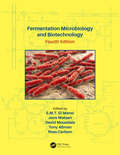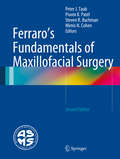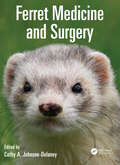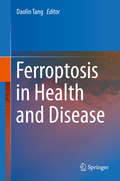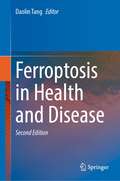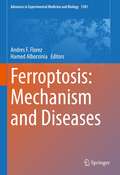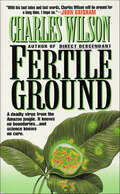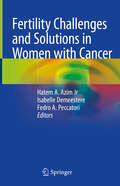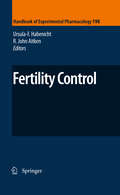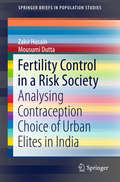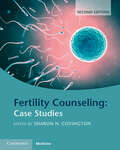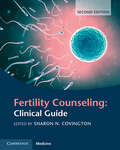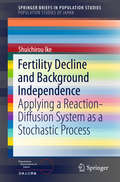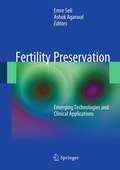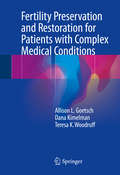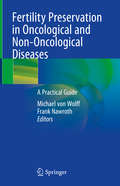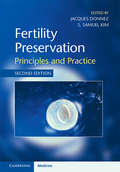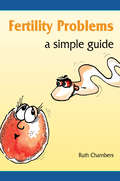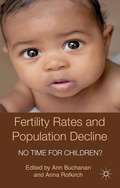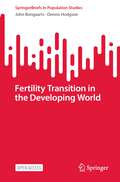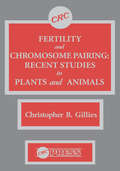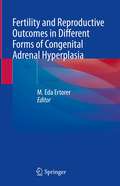- Table View
- List View
Fermentation Microbiology and Biotechnology, Fourth Edition
by Jens Nielsen E. M. El-Mansi David Mousdale Ross P. CarlsonFermentation Microbiology and Biotechnology, 4th Edition explores and illustrates the broad array of metabolic pathways employed for the production of primary and secondary metabolites, as well as biopharmaceuticals. This updated and expanded edition addresses the whole spectrum of fermentation biotechnology, from fermentation kinetics and dynamics to protein and co-factor engineering. It also sheds light on the new strategies employed by industrialist for increasing tolerance and endurance of microorganisms to the accumulation of toxic wastes in microbial-cell factories. The new edition builds upon the fine pedigree of its earlier predecessors and extends the spectrum of the book to reflect the multidisciplinary and buoyant nature of this subject area. Key Features Covers the whole spectrum of the field from fermentation kinetics to control of fermentation and protein engineering. Includes case studies specifically designed to illustrate industrial applications and current state-of-the-art technologies. Presents the contributions of eminent international academics and industrial experts. Offers new chapters addressing: The prospects and the role of bio-fuels refineries, Control of metabolic efflux to product formation in microbial-cell factories and Improving tolerance of microorganisms to toxic byproduct accumulation in the fermentation vessel.
Ferraro's Fundamentals of Maxillofacial Surgery
by Peter J. Taub Pravin K. Patel Steven R. Buchman Mimis N. CohenFerraro's Fundamentals of Maxillofacial Surgery is the newly revised and updated second edition of the text originally edited by James W. Ferraro. Written for trainees and students as well as experts in oral and maxillofacial surgery, and experts in related subspecialties such as otolaryngology and plastic surgery, this highly illustrated text is an invaluable source of hands-on, practical knowledge for those taking the ASMS Basic Course, or for any specialist seeking a comprehensive review of maxillofacial surgery.
Ferret Medicine and Surgery
by Cathy Johnson-DelaneyThe text is currently the most up-to-date book on ferret medicine and as such, would be an important addition to the library of veterinary practices seeing these lively, curious and fun-loving pets. Aidan Raftery, Veterinary Record 17 March 2018 Ferrets are becoming increasingly popular as pets, rivalling rabbits as the third most favoured domestic pet after dogs and cats. Ferret Medicine and Surgery discusses the veterinary aspects of this incredible little creature. The book covers ferret medicine and common surgeries, providing a comprehensive reference for the veterinary practitioner. Each chapter of disorders is designed to be inclusive and includes cross references to other chapters throughout as well as some highlights of anatomy and physiology as a review. The format allows easy access to information providing answers to problems that arise in practice. Thoroughly illustrated with high-quality photographs and line drawings, the book is designed to provide quick, concise information of immediate use to the practitioner.
Ferroptosis in Health and Disease
by Daolin TangThis book sheds new light on ferroptosis, as an only recently recognised form of regulated cell death. Its respective chapters address the numerous implications that ferroptosis can have for virtually all aspects of metabolism. They also share insights on the morphological characterisation of ferroptosis and highlight the different pathways of induction. Accordingly, the book offers a unique perspective on a mechanism that is involved in a multitude of pathologies, including cancer cell death, neurotoxicity, neurodegenerative diseases, acute renal failure, drug-induced hepatotoxicity, tissue ischemia/reperfusion injury, and T cell immunity. Readers will learn in which cell types this form of regulated cell death is likely to occur, and how it can be pharmacologically influenced, making the book a fascinating and informative read not only for scientists working in cell biology, but also for clinicians in the field of cancer research.
Ferroptosis in Health and Disease
by Daolin TangThis updated and expanded volume gives new insights on ferroptosis – an iron-dependent form of non-apoptotic cell death. The collection of chapters discusses the two major pathways through which ferroptosis can occur: the extrinsic or transporter-dependent pathway and the intrinsic or enzyme-regulated pathway.Readers will gain an understanding of the multiple levels, on which this special cell death is regulated. Hence, the contributions will take a closer look at epigenetic, transcriptional, posttranscriptional and posttranslational layers. Among the described regulators and transcription factors are GPX4, ACSL4 and NFE2L2. This edited volume collects reviews related to current knowledge on the integrated molecular machinery of ferroptosis, thereby also describing how dysregulated ferroptosis is involved in human diseases.
Ferroptosis: Mechanism and Diseases (Advances in Experimental Medicine and Biology #1301)
by Hamed Alborzinia Andrés F. FlorezThis book focuses on the emerging role of ferroptosis in human diseases. It gives a detailed perspective on how to induce or suppress ferroptosis to treat challenging conditions such as infectious diseases, including COVID-19, tuberculosis, parasitic diseases and cancer. The book serves as a practical guide by providing a valuable collection of all currently known activators or inhibitors of ferroptosis. It will enable readers to choose molecules for experimental design for in vitro and in vivo studies of ferroptosis. Furthermore, this volume highlights the aspects of iron metabolism and its connection to ferritinophagy, a ferritin selective autophagy, with profound implications in neurodegenerative diseases such as Alzheimer, Parkinson, Huntington and ALS. Lastly, it describes necroptosis, another important form of cell death, along with its connections to human disorders and potential crosstalk with ferroptosis. While covering basic concepts, the book delves into mechanisms and modulation of ferroptosis for treating a wide variety of human diseases thus offering a valuable and informative resource for both, scientists and clinical researchers.
Fertile Ground
by Charles WilsonA team of scientists explore an uncharted region of the Amazon, seeking exotic plants that may yield cures for the diseases afflicting humanity. But their mission goes horribly wrong when the party is attacked by the area's mysterious natives, and when they learn too late that they've landed in the cauldron of a deadly, unknown virus.
Fertility Challenges and Solutions in Women with Cancer
by Hatem A. Azim Isabelle Demeestere Fedro A. PeccatoriThis book, written by global experts in the field, provides a thorough overview on fertility and pregnancy challenges and solutions in women who are being or have been treated for cancer. The book addresses several topics, including pregnancy outcomes after a cancer diagnosis, the impacts of systemic anticancer therapy on fertility, the essentials of fertility preservation approaches in cancer patients, and fertility counseling. This is in addition to controversial topics like the role of ovarian stimulation in breast cancer patients, fertility preservation in cancer patients with BRCA mutation and the evolving role of GnRH analogues. Within this context, key open questions are discussed with reference to the latest evidence. The aim is to provide clinicians with a reliable resource that documents the most up-to-date knowledge on the feasibility and safety of the different approaches to fertility preservation and on the management of female cancer patients who would like to preserve fertility and achieve a pregnancy following their treatment.
Fertility Control
by Robert John Aitken Ursula-F. HabenichtThis book represents a unique collection of papers from internationally renowned experts to give us a state-of-the art summary of current concepts in reproductive biology. The narrative has been developed to highlight how new gains in our understanding of reproductive mechanisms have generated unique opportunities for contraceptive development.
Fertility Control in a Risk Society
by Zakir Husain Mousumi DuttaThis book analyses the reasons for relying on behavioural contraception methods among urban 'elites' in India and examines their efficacy in controlling fertility. It also traces variations in contraception choice over the reproductive cycle of women. Although researchers and policy makers generally equate reliance on behavioural contraceptive methods with low levels of education and awareness and lack of desire to control fertility, this perception has been questioned in recent years. The authors' analysis of the first three rounds of the National Family Health Survey (NFHS) data in India reveals that behavioural contraceptive methods are popular in eastern India. Moreover, it is urban educated women who rely on behavioural methods, and are apparently able to regulate fertility quite effectively with such methods. NFHS data, however, has some limitations and this motivates the authors to explore birth control methods through primary surveys of currently married graduate women in Kolkata. The use of behavioural contraception methods is a little researched area globally and this is the first book focusing on the topic in India.
Fertility Counseling
by Sharon N. CovingtonUsing real-world cases, this clinical guide details the psychosocial challenges faced by patients navigating the world of medically assisted reproduction (MAR). It describes in depth the latest perspectives on counseling approaches to the evolving complexities of family creation, whether fertility issues are a presenting problem or occur during the course of therapy or the aftermath of a struggle with infertility. Applying an evidence-based, cross-border approach, international experts not only discuss advanced perspectives on topics such as third party reproduction, pregnancy loss and adoption, but also newer issues of fertility preservation, 'older' patient parenthood, LGBT and singles' family creation. A comprehensive resource, it explores pioneering insights into fertility counseling such as spirituality, developing disclosure language, a counselor's personal fertility issues, and more. This is an essential aid for medical and mental health professionals to develop and refine the skills needed to treat the increasingly diverse and complex needs of MAR patients.
Fertility Counseling: Case Studies
by Sharon CovingtonThis second edition of the essential guide for reproductive professionals is now available in a Clinical Guide and a Case Studies Guide, presenting the most current knowledge on counseling patients with diverse needs amidst rapidly advancing modern technology. The Case Studies guide relates the accessible, real-world experiences and perspectives as leading international practitioners share their stories applying clinical concepts to treatment practice. Chapters cover current, unaddressed and emerging areas in reproductive mental health including consequences of direct-to-consumer DNA testing, racial and cultural sensitivity and tele-mental health. Among the new topics are transgender ART, recurrent pregnancy loss, post-partum adjustment, and the pregnant therapist. For an in-depth presentation of clinical concepts, discover the Clinical Guide, which provides a foundational understanding of the medical and psychosocial experience of fertility treatment. An essential aid for medical and mental health professionals, this comprehensive guide allows clinicians to develop and refine the skills required to address the increasingly complex needs of fertility patients.
Fertility Counseling: Clinical Guide
by Sharon CovingtonThe second edition of the essential guide for reproductive professionals is now available in a Clinical Guide and a Case Studies Guide, presenting the most current knowledge on counseling diverse patients amidst rapidly advancing modern technology. Follow an in-depth presentation of clinical concepts in this Clinical Guide for a foundational understanding of the medical and psychosocial experience of fertility treatment. Explore the areas of reproductive psychology, therapeutic approaches, assessment and preparation in assisted reproduction, addressing the needs of diverse populations, and clinical practice issues. Featuring new topics such as transgender ART, recurrent pregnancy loss, post-partum adjustment, and the pregnant therapist. Then in Case Studies, discover the accessible, real-world experiences and perspectives as leading international practitioners share their stories applying clinical concepts to treatment practice. An essential aid for medical and mental health professionals, this comprehensive guide allows clinicians to develop and refine the skills required to address the increasingly complex psychosocial needs of fertility patients.
Fertility Decline and Background Independence
by Shuichirou IkeIn this book the author maintains that fertility declines independently of its "background". Normally, fertility decline is thought to occur as a result of alteration in the socioeconomic background such as the decline of the infant mortality rate, urbanization, the level of literacy, and so on. This point of view has been regarded as equivalent to "demographic transition". However, the concept of demographic transition is so superficial, naïve and unscientific that it should be applied merely to the ostensible demographic phenomena, not to the mechanisms of fertility decline. The author regards this way of thinking, i. e. , that the occurrence of fertility decline is dependent on socioeconomic background, as the "background dependence" of fertility decline. On the contrary, there is considerable counterevidence to the background dependence of fertility decline. The argument is made that background dependence lacks positive evidence and predictability and consequently, is falsifiable. That decisive counterevidence is introduced in this book. The author revives the diffusion hypothesis of fertility decline at the point of the number of children per couple as the reaction-diffusion process in a mathematical equation. Fertility decline in Europe in the eighteenth and nineteenth centuries occurred as a reaction-diffusion process independent of socioeconomic background. In Japan as well, fertility (the number of children per couple) declined independently of background. This book provides ample evidences persuasively demonstrating this independence of fertility in Japan. The occurrence of marriage is also independent of socioeconomic background. Thus the author formalizes the marriage function as an integral equation of marriage probability, as a result, it demonstrates a better fit with the observed data than does any other marriage function. Occurrence of marriage is almost solely dependent on the density of marriages that occur in a given subspace.
Fertility Preservation
by Ashok Agarwal Emre SeliA growing majority of women in the western hemisphere have been delaying initiation of childbearing to later in life. Consequently, more women in their late 30s to early 40s are attempting to get pregnant for the first time than ever before. Since the incidence of most cancers increases with age, delayed childbearing results in more female cancer survivors interested in fertility preservation. In this book, the editors provide strategies for fertility preservation in women and men who require gonadotoxic treatment. In addition, epidemiologic, ethical, medico-legal, psychologic, and social aspects of fertility preservation are discussed. Using a format that combines concise scientific background with practical methodological information and easy-to-grasp algorithms, the chapters all conform to a uniform structure, including a brief abstract, keyword glossary, step by step protocol of laboratory procedures, key issues in commentary and a list of references. The result is a unique, practical reference guide for reproductive endocrinologists, urologists, embryologists, reproductive scientists, and oncologists.
Fertility Preservation and Restoration for Patients with Complex Medical Conditions
by Teresa K. Woodruff Allison L. Goetsch Dana KimelmanThis unique book is a comprehensive guide for healthcare providers who treat patients with complex medical conditions but lack the resources to address fertility and sexuality concerns and help patients navigate their fertility decision-making process. It presents up-to-date information concerning fertility preservation and restoration for patients with hereditary cancer syndromes, disorders of sex development, hematologic diseases, genetic disorders of gonadal dysfunction, immunologic diseases, gynecologic diseases, endocrine disorders, and autoimmune and inflammatory diseases. Utilizing a practical, user-friendly format, each chapter discusses the epidemiology, classification, risk factors and/or clinical manifestations, and diagnosis and treatment modalities specific to each condition, as well as the effect of it or its treatment on fertility and unique options that may exist. Complex medical conditions are inherently difficult to manage, and reproductive interventions are often not part of the conversation. As such, Fertility Preservation and Restoration for Patients with Complex Medical Conditions will be an excellent resource for primary care physicians, obstetrician/gynecologists, endocrinologists, oncologists, and other health professionals working with patients with fertility concerns. This book, together with Oncofertility: Fertility Preservation for Cancer Survivors; Oncofertility: Ethical, Legal, Social, and Medical Perspectives; Oncofertility Medical Practice: Clinical Issues and Implementation; Oncofertility Communication: Sharing Information and Building Relationships across Disciplines; and Pediatric and Adolescent Oncofertility: Best Practices and Emerging Technologies, provides scientific and medically relevant information on fertility preservation from all vantage points and is an indispensable series for those interested in fertility management in cancer or complex settings.
Fertility Preservation in Male Cancer Patients
by John P. Mulhall Linda D. Applegarth Robert D. Oates Peter N. SchlegelMen with cancer rendered infertile by surgery, chemotherapy, radiation and hormone therapy that are needed to control or cure their disease are increasingly being offered the chance to preserve their reproductive potential through artificial reproductive technologies. Cryopreservation of sperm and testicular tissue have increasingly helped boys and men preserve their fertility. There is a growing subspecialty within reproductive medicine aimed at fertility preservation in this population. Furthermore, strategies are being developed that may in the future revolutionize the approach to such patients. Written by international authorities in the field of fertility preservation, this comprehensive book is aimed at clinicians dealing with male cancer patients, in particular, urologists, andrologists, oncologists, pediatricians, nursing staff as well as clinicians in reproductive endocrinology. The text reviews the impact of cancers and their treatment on male fertility, the available fertility preservation strategies and post-treatment management.
Fertility Preservation in Oncological and Non-Oncological Diseases: A Practical Guide
by Frank Nawroth Michael Von WolffThis practical book focuses on the most recent advances in fertility preservation in oncological and non-oncological patients. It presents the steps that need to be followed prior to treatment for successful fertility preservation, and describes in detail the medical conditions requiring fertility preservation, including precise information on the risk of fertility loss, prognosis, risk of ovarian metastasis and other possible risks. The book also provides information on how to perform the preservation techniques (success rates, risks, etc.) and on what to do after the treatment (in cases of bleeding during chemotherapy, menopause, wish to conceive, etc.). Written by experts in the field, including members of the globally known network FertiPROTEKT and leading oncologists and specialists, this practical and easy-to-use book is a valuable resource for all clinicians involved in fertility preservation for patients with specific diseases
Fertility Preservation: Principles and Practice (Advances In Experimental Medicine And Biology Ser. #761)
by Jacques Donnez S Samuel KimThis new edition provides a much-needed reference book to accommodate emerging and expanding knowledge in fertility preservation, the rapidly growing field of reproductive medicine associated with advances in oncology. Written by a team of world-leading experts in the field and comprehensive in its scope, the book covers the full range of techniques and scientific concepts in detail. It opens with an introduction to fertility preservation in both cancer and non-cancer patients, followed by fertility preservation strategies in males and females, including medical/surgical procedures, ART, cryopreservation and transplantation of ovarian tissue, and in-vitro follicle culture. Concluding chapters address new technologies, as well as ethical, legal and religious issues. The book has been thoroughly updated, includes additional contributors, and now provides greater focus on practical and clinically relevant issues. Richly illustrated throughout, this is a key resource for clinicians specializing in reproductive medicine, gynecology, oncology, hematology, endocrinology and infertility.
Fertility Problems: A Simple Guide
by Ruth ChambersPCGs will plan their future and their goals around Primary Care Investment Plans - documents that seem to owe more to a background in business than they do to healthcare. This workbook is about demystifying business and making planning easy. The series of questions, exercises and answers is designed to help the reader clarify their thinking and "depuzzle" the process.
Fertility Rates and Population Decline
by Ann Buchanan Anna RotkirchWhile many worry about population overload, this book highlights the dramatic fall in fertility rates globally exploring questions such as why are parents having fewer babies? Will this lead to population decline? What will be the impact of a world with fewer children and can social policy reverse fertility decline?
Fertility Transition in the Developing World (SpringerBriefs in Population Studies)
by John Bongaarts Dennis HodgsonThis open access book provides an overview and analysis of the causes and consequences of the massive and highly consequential transition in reproductive behaviour that occurred in Asia, Latin America, and Africa since the mid-20th century. In the 1950s contraceptive use was rare and women typically spend most of their reproductive years bearing and rearing children. By 2020 fertility and contraceptive use in Asia and Latin America reached levels commonly observed in the developed world. Africa’s fertility is still high, but transitions have started in all countries. This monograph is the first to provide a comprehensive analysis of these trends and their determinants, covering changes in reproductive behaviour (e.g., use of contraception and abortion), preferences (e.g., desire to limit and space births) and the role of socioeconomic development (e.g., education). The role of government policies and in particular family planning programs is discussed in depth. Particular attention is given to provide a balanced assessment of several political and scientific controversies that have beset the field. As such this book provides an interesting read for a wide audience of undergraduate and graduate students, researchers, and public health policy makers.
Fertility and Chromosome Pairing
by Christopher Bob GilliesThis book discusses the nature of meiotic chromosome pairing effects which may play a role in the determination of fertility. In particular, data and illustrations from the application of recently developed electron microscopic spreading techniques will allow researchers in related fields to come to grips with the recent advances in the cytogenetics of meiotic chromosome pairing behavior. Topics dealt with include meiotic and synaptonemal complex behavior in humans and mice with a variety of chromosomal and genetic abnormalities, sex chromosome pairing in mammals and birds, the significance for fertility or pairing in mammals and birds, the significance for fertility of XY pairing and crossing over, the effects of hybridity on pairing and fertility in plants, and the genetic control of synaptonemal complex formation and crossing over in polyploids. This is a timely reference book for graduate level medical and veterinary students, and scientists in the field of genetics and cell biology.
Fertility and Reproductive Outcomes in Different Forms of Congenital Adrenal Hyperplasia
by M. Eda ErtorerThis book covers all forms of Congenital Adrenal Hyperplasia (CAH) and provides a comprehensive overview of accompanying reproductive problems. Affected individuals may exhibit low fecundability, infertility, recurrent miscarriages, painful sexual intercourse, sexual orientation changes, etc. If not diagnosed and treated properly, their children may also experience developmental disorders of the external genitalia. Depending on the defects in enzymes, severity of the mutations and residual enzymatic activities, the clinical presentation may differ from patient to patient. As these disorders are encountered relatively rarely, many cases are either undiagnosed or inappropriately treated. Given its scope, this book offers a valuable guide for gynecologists, endocrinologists, pediatricians, and professionals in reproductive medicine, as well as GPs, practicing physicians, medical students and residents.
Fertility, Cycles and Nutrition
by Marilyn M. ShannonHow your diet affects your menstrual cycles and fertility.
